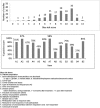Prevalence of depression in cancer patients: a meta-analysis of diagnostic interviews and self-report instruments
- PMID: 24105788
- PMCID: PMC4282549
- DOI: 10.1002/pon.3409
Prevalence of depression in cancer patients: a meta-analysis of diagnostic interviews and self-report instruments
Abstract
Objective: We aimed to investigate the prevalence of depression in cancer patients assessed by diagnostic interviews and self-report instruments, and to study differences in prevalence between type of instrument, type of cancer and treatment phase.
Methods: A literature search was conducted in four databases to select studies on the prevalence of depression among adult cancer patients during or after treatment. A total of 211 studies met the inclusion criteria. Pooled mean prevalence of depression was calculated using Comprehensive Meta-Analysis.
Results: Hospital Anxiety and Depression Scale-depression subscale (HADS-D) ≥ 8, HADS-D ≥11, Center for Epidemiologic Studies ≥ 16, and (semi-)structured diagnostic interviews were used to define depression in 66, 53, 35 and 49 studies, respectively. Respective mean prevalence of depression was 17% (95% CI = 16-19%), 8% (95% CI = 7-9%), 24% (95% CI = 21-26%), and 13% (95% CI = 11-15%) (p < 0.001). Prevalence of depression ranged from 3% in patients with lung cancer to 31% in patients with cancer of the digestive tract, on the basis of diagnostic interviews. Prevalence of depression was highest during treatment 14% (95% CI = 11-17%), measured by diagnostic interviews, and 27% (95% CI = 25-30%), measured by self-report instruments. In the first year after diagnosis, prevalence of depression measured with diagnostic interviews and self-report instruments were 9% (95% CI = 7-11%) and 21% (95% CI = 19-24%), respectively, and they were 8% (95% CI = 5-12%) and 15% (95% CI = 13-17%) ≥ 1 year after diagnosis.
Conclusions: Pooled mean prevalence of depression in cancer patients ranged from 8% to 24% and differed by the type of instrument, type of cancer and treatment phase. Future prospective studies should disentangle whether differences in prevalence of depression are caused by differences in the type of instrument, type of cancer or treatment phase. © 2013 The Authors. Psycho-Oncology published by John Wiley & Sons, Ltd.
Keywords: cancer; depression; epidemiology; meta-analysis; neoplasms; oncology.
© 2013 The Authors. Psycho-Oncology published by John Wiley & Sons, Ltd.
Figures
References
-
- Ferlay J, Shin HR, Bray F, Forman D, Mathers C, Parkin DM. IARC CancerBase No. 10 [Internet] Lyon, France: International Agency for Research on Cancer; 2010. GLOBOCAN 2008 v 1.2, cancer incidence and mortality worldwide. Available from: http://globocan.iarc.fr, accessed on 23/01/2012.
-
- Derogatis LR, Morrow GR, Fetting J, et al. The prevalence of psychiatric disorders among cancer patients. JAMA. 1983;249:751–757. - PubMed
-
- Prieto JM, Blanch J, Atala J, et al. Psychiatric morbidity and impact on hospital length of stay among hematologic cancer patients receiving stem-cell transplantation. J Clin Oncol. 2002;20:1907–1917. - PubMed
-
- Colleoni M, Mandala M, Peruzzotti G, Robertson C, Bredart A, Goldhirsch A. Depression and degree of acceptance of adjuvant cytotoxic drugs. Lancet. 2000;356:1326–1327. - PubMed
Publication types
MeSH terms
LinkOut - more resources
Full Text Sources
Other Literature Sources
Medical
Miscellaneous



